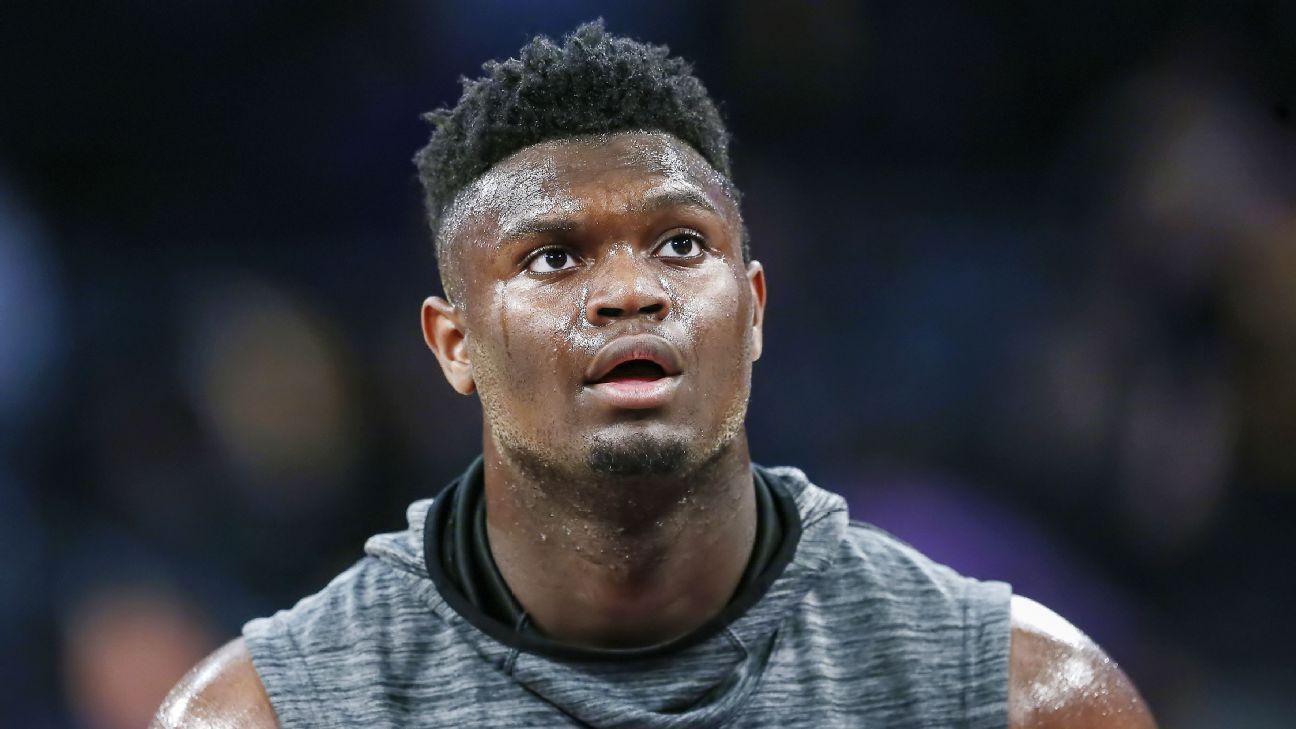
Attorneys representing Zion Williamson's former marketing representative and her company have asked the New Orleans Pelicans star to admit that his mother and stepfather demanded and received gifts, money and other benefits from persons acting on behalf of Adidas and Nike and also from people associated with Duke to influence him to sign with the Blue Devils and to wear Nike or Adidas products.
Williamson, who played one season at Duke before becoming the No. 1 pick in the 2019 NBA draft, sued Gina Ford and Prime Sports in June in an attempt to terminate his marketing agreement with her company.
Williamson's attorney's claimed the contract was in violation of North Carolina's Uniform Athlete Agents Act because Prime Sports is not certified by the NBA Players Association nor a registered athlete agent in North Carolina or Florida.
Ford and Prime Sports Marketing sued Williamson, Creative Artists Agency [CAA] and two of its employees in a Florida court the same month, alleging CAA interfered with Prime Sports' deal with Williamson and that he breached their five-year contract. The lawsuit seeks $100 million in punitive damages.
In a filing with Miami-Dade County court last week, Ford's attorneys asked Williamson to admit that several statements were true, including:
• Sharonda Sampson, Williamson's mother, and Lee Anderson, his stepfather, "demanded and received gifts and economic benefits from persons acting on behalf of Duke University (directly and/or indirectly) to influence [Williamson] to attend Duke University to play basketball."
• Sampson and Anderson "demanded and received gifts, money and/or other benefits from persons on behalf of Nike (directly and/or indirectly) to influence [Williamson] to attend Duke University to play basketball."
• Sampson and Anderson "demanded and received gifts, money and/or other benefits from persons acting on behalf of Adidas (directly and/or indirectly) to influence [Williamson] to wear Adidas shoes" and to "influence [Williamson] to attend a college that endorsed Adidas shoes."
• Before becoming a student at Duke, Williamson "or person(s) acting on [his] behalf (including but not limited to Sharonda Sampson and Lee Anderson) accepted benefits from a NCAA-certified agent that are not expressly permitted by the NCAA legislation" between Jan. 1, 2014, and April 14, 2019.
In a separate filing last week, Ford's attorneys asked Williamson to disclose his and his parents' addresses while he attended Duke. The interrogatories also asked for landlords' names and monthly rent payments.
Requests for admissions are a discovery tool in civil cases that allow one party to request that an adversary admit or deny the truth of a statement under oath.
In April, a U.S. District Court judge in North Carolina denied Ford's motion to dismiss Williamson's complaint against her. A Florida state court judge in December had denied the defendants' combined motion to dismiss Ford's and Prime Sports Marketing's complaint.
During an October 2018 federal criminal trial in New York, in which three men were convicted for their roles in pay-for-play schemes to send high-profile recruits to Adidas-sponsored schools, one defense attorney attempted to introduce wiretap recordings, in which former Adidas consultant Merl Code and Kansas assistant Kurtis Townsend discussed what it would take for Williamson to sign with the Jayhawks.
According to a transcript of the call, which was read in court by defense attorney Mark Moore, Townsend told Code, "Hey, but between me and you, you know, [Anderson] asked about some stuff. You know? And I said, 'Well, we'll talk about that after you decide.'
"And then Mr. Code says: 'I know what he's asking for,'" Moore continued. "... 'He's asking for opportunities from an occupational perspective. He's asking for money in the pocket. And he's asking for housing for him and the family.'
"And they go on to talk. And Mr. Townsend says: 'So I've got to just try to work and figure out a way. Because if that's what it takes to get him for 10 months, we're going to have to do it some way.'"
At the time, athletics director Kevin White said Duke officials worked with the NCAA and ACC to certify Williamson's eligibility.
"All Duke student-athletes are subject to a thorough review to ensure their eligibility," White said in a statement at the time. "In men's basketball, for the past several summers, Duke compliance officials, top recruits and their families have engaged in and cooperated fully with the NCAA Eligibility Center's enhanced amateurism certification process. Duke works closely with the NCAA and the Atlantic Coast Conference on all compliance and eligibility matters. As we have stated in the past, we have an uncompromising commitment to compliance in athletics."
Celebrity attorney Michael Avenatti also alleged that Nike paid Williamson's mother for consulting services while her son was a top high school recruit, and his attorneys filed court motions that alleged Nike employees at least approved under-the-table payments to Williamson while he was still in high school in February 2017.
Nike's alleged offer of $35,000 or more for Williamson was purportedly discovered among "text messages, e-mails and other documents from 2016-17 ... proving that Nike executives had arranged for and concealed payments, often in cash, to amateur basketball players and their families and 'handlers," according to the motion filed in U.S. District Court in New York.
Duke said it conducted a months-long investigation into Avenatti's allegations and found no evidence of wrongdoing.
In February, a federal jury convicted Avenatti of attempting to extort as much as $25 million from Nike over threats that he would expose misdeeds in the apparel company's grassroots basketball division. He faces up to 42 years in prison.















 Phone: (800) 737. 6040
Phone: (800) 737. 6040 Fax: (800) 825 5558
Fax: (800) 825 5558 Website:
Website:  Email:
Email: 






